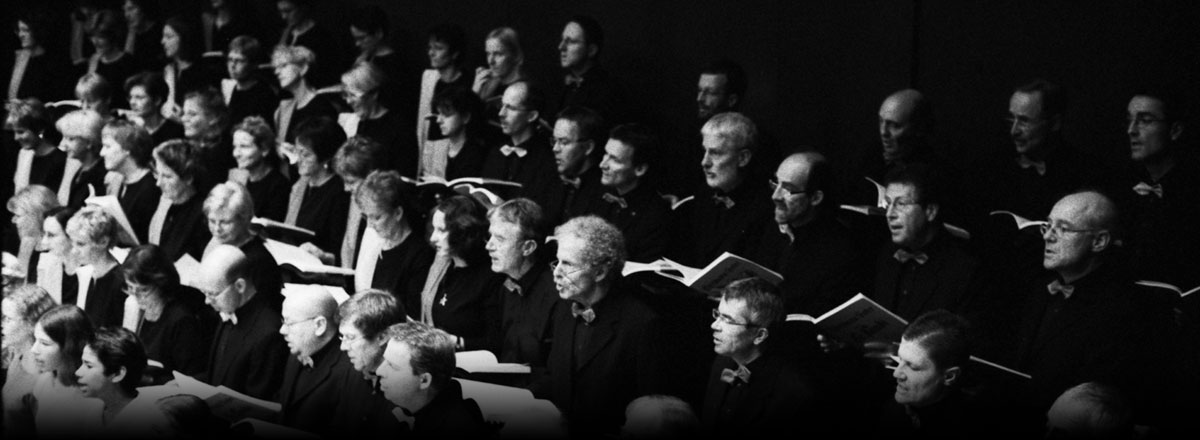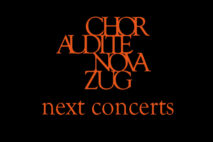Impressions of the 2015 SFEC Weekend with Simon Halsey

It was hard to tell who the star was on the weekend of January 16-18: the Ägeri Valley, high up in the hills near Zug, with its fresh blanket of snow; the 350 choral singers and conductors, who had travelled there from throughout Switzerland; the ideal infrastructure – master class, choral workshop, rehearsal hall, concert venue, dining hall, party room and accommodation – all within short walks of one another; the huge choir stand with its twenty levels in the Parish Church – or the director, Simon Halsey, who had arrived there directly from London. Of course the star was the director, but stars also sparkled in the eyes of the six young conducting students chosen for the privilege of working with him on Friday and Saturday. The choir placed at their disposal was the 28 strong Leonardo Ensemble, which later joined the choral workshop and sang the solo parts in Antonin Dvořák’s Mass in D major for choir and organ, op. 86. This mass constituted the second part of the gala concert on Sunday. The first part consisted of a cappella music: Willy Burkhards “Kleiner Psalter”, op. 82, performed by the Leonardo Ensemble conducted by Nicolas Fink, and five sacred and secular songs performed by the Audite Nova Choir conducted by Johannes Meister. An Organizing Committee drawn from the members of the latter body was responsible for planning and coordinating the weekend. The meals were catered by ZUWEBE, the Zug Workshop for the Handicapped (Zugerische Werkstätte für Behinderte), and at the party on Saturday the dance band consisted of seven young musicians from the group “Alpini Vernämlassig”. In short, the participants were assured conditions which left them free to concentrate fully on singing.
From among the comments of the participants the primary – and unanimous – theme noted was the experience of working with a world famous choral conductor known for his remarkable pedagogical and methodological skills, a delightful sense of humour and a natural, modest manner. His intensive workshop with many practical tips for choir masters (structure, experiments with choral sound and colour, questions of tempo, illustrations, etc.), as well as his encouragement to ask oneself about the source, theme and message of a piece of music and then to listen carefully, proved both challenging and refreshing. Finally there were the lasting memories of the special feeling of singing in a 300 strong choir, and not the least the enriching encounters with other choral conductors and singers.
This brilliant choral conductor is currently passing on his rich musical experience to a new generation of musicians in the form of a book published in 2011 (in German): “Vom Konzept zum Konzert” (S. Halsey, in collaboration with W. Roloff, Schott, Mainz, 272 pages and 2 DVD’s).
But let Simon Halsey have his own say. In one of the master-class lessons he mentioned that 15 years ago, when he began with the Berlin Radio Chorus (Berliner Rundfunkchor), which regularly performed in concerts of the Berlin Philharmonic Orchestra, the orchestra had the leading role and the chorus an accompanying role. Today – he uses the word revolution for this transformation – the presence of the choir on stage is such that it is rather the orchestra which accompanies… (Undoubtedly this is a result of the fruitful collaboration with Simon Rattle. Both have genuinely inspired their respective musical forces.) How could that come about? It succeeds when both orchestra and choir conductors themselves “are music”, so to speak, and try to convey this to their musicians through presence, clarity and appreciation. Simon’s words are always infused with an inner smile – out of sympathy for the music’s creator and for the individuals who bring the music to life, conjuring it up from inner depths. In the process they are amazed to discover the profundity of their inner being. The piano passage in “Dona nobis pacem” of the Dvořák Mass must be sung “privately”, he says, and continues “… and as tenderly as if you were playing the violin.” He closes his eyes, lifts his left arm and with his right draws an imaginary bow back and forth, oblivious to his surroundings. He tells about a BBC Proms concert in which he prepared the choral parts of Britten’s War Requiem with teenagers. After the last note the public sat there transfixed. “Do you know for how long?” and his quizzical gaze moves around the room. “Two minutes, absolute silence. Imagine…”
(Hanspeter Reichmuth, English translation: Andrew Glass)
Photo credit: Lukas Wehrli


